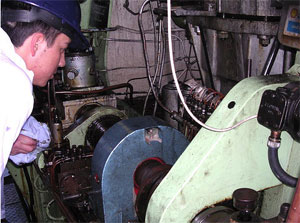Marine Engineer
Tasks & duties
Shore-based marine engineers:

- repair and maintain marine engines and machinery for on-shore marine engineering companies
- repair engines on board ships
- order spare parts and equipment for ships
- may perform specialised fabrication, maintenance and diagnostics or electrical fitting tasks.
Sea-going marine engineers:
- have charge of engines and mechanical, electrical and electronic equipment in ships' engine rooms (and elsewhere aboard)
- keep ships travelling at required speeds by operating propulsion engines according to orders from the captain or computers on the bridge
- maintain services to electrical power, heating, ventilation, refrigeration, water and sewerage systems
- check, test and maintain automatic controls and alarm systems
- diagnose engine and machinery problems, and carry out maintenance and repairs
- may supervise other engineers and crew members, and be responsible for training them in routine and emergency duties
- order and receive fuel and lubricating oils, spare parts and other consumable goods
- maintain records of engineering department activities.
Specialisations
Shore-based marine engineer
Shore-based marine engineers work on vessels when they are in the dry dock.
Restricted limit vessel marine engineer
Restricted limit vessel marine engineers work on vessels in restricted waters, such as harbour ferries, charter launches or small cargo ships.
Fishing industry marine engineer
Fishing industry marine engineers work on small, inshore fishing vessels or coastal fishing vessels.
Merchant navy marine engineers
Merchant navy marine engineers work on large, merchant ships in coastal or international waters.
Skills & knowledge

- knowledge of mechanical engineering
- knowledge of pneumatic and hydraulic machinery (operated with pressure caused by air and liquids)
- knowledge of how to operate electrical equipment
- knowledge of computers and electronics
- knowledge of maths, physics and chemistry
- knowledge of safety regulations and procedures
- fire-fighting skills
- knowledge of home and foreign port regulations
- excellent problem-solving skills to diagnose engine and machinery faults
- the ability to make decisions quickly and confidently in emergencies
- excellent communication skills
- the ability to work quickly to fit in with ships' cargo-handling and sailing schedules.
Entry requirements
To become a marine engineer you need to gain a Maritime Safety Authority (MSA) approved national certificate, and complete a prescribed amount of sea service. This is followed by a course to gain your Marine Engineer Class 1, 2 or 3 to become a merchant navy marine engineer, or Class 4, 5 or 6 to become a fishing industry, restricted limit vessel or shore-based marine engineer.
Gaining Classes 4, 5 or 6 can be achieved solely through sea service, but completing a national certificate reduces the amount of sea service required.
For more information on relevant national certificates and approved training providers, contact the Maritime Safety Authority.
The Royal NZ Navy also offers marine engineering cadet training.
There are different entry requirements for each of the following maritime industry sectors: merchant navy, fishing industry and restricted-limit sector. For further information contact the Maritime Safety Authority.
Secondary education
There are no specific secondary educational requirements for marine engineers, although most employers prefer at least three years of secondary education. Useful subjects include English and maths.
Training on the job
Marine engineers learn many skills on the job. They may be required to attend courses to learn about new equipment and machinery.
Related courses
Marine Engineering
For more information, please refer to Career Services.
Sponsors include
Document Actions
